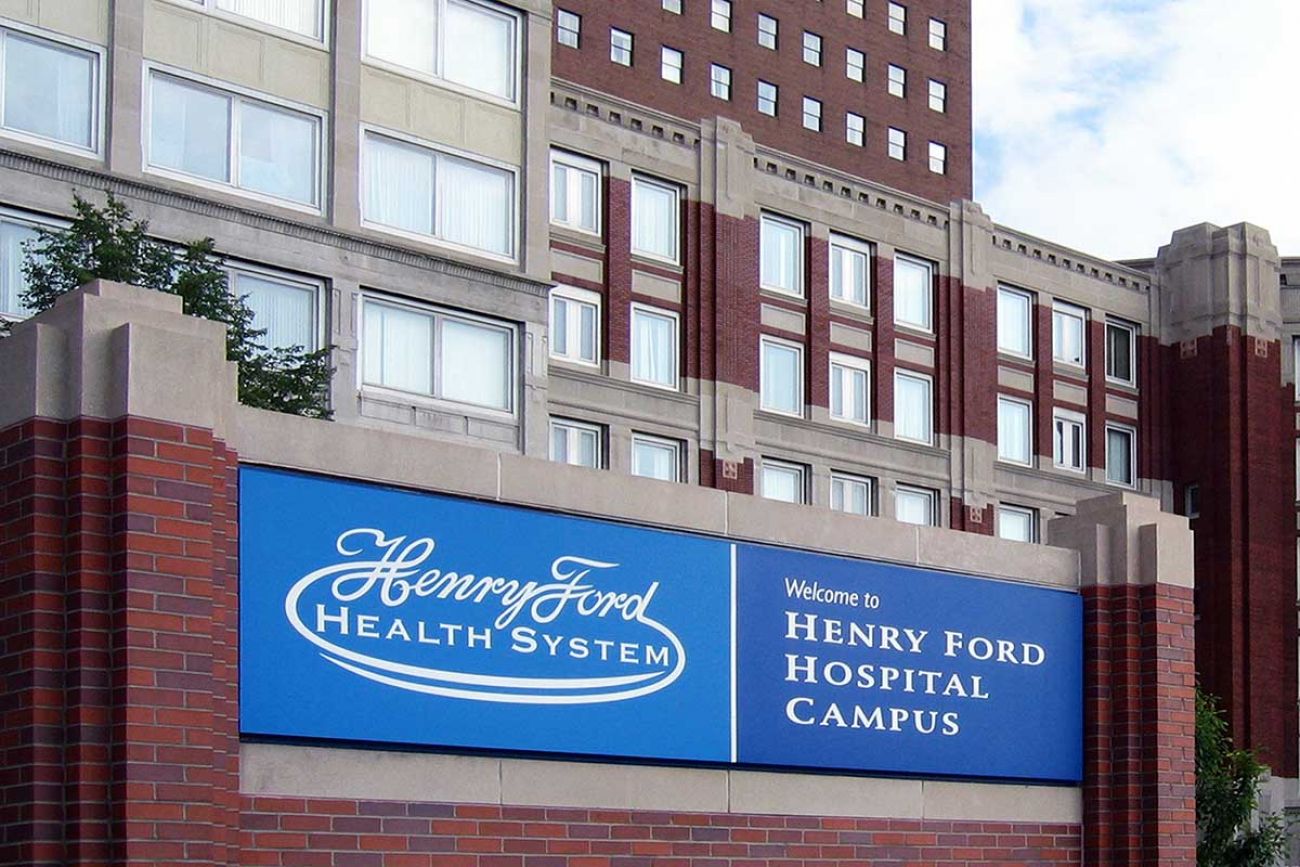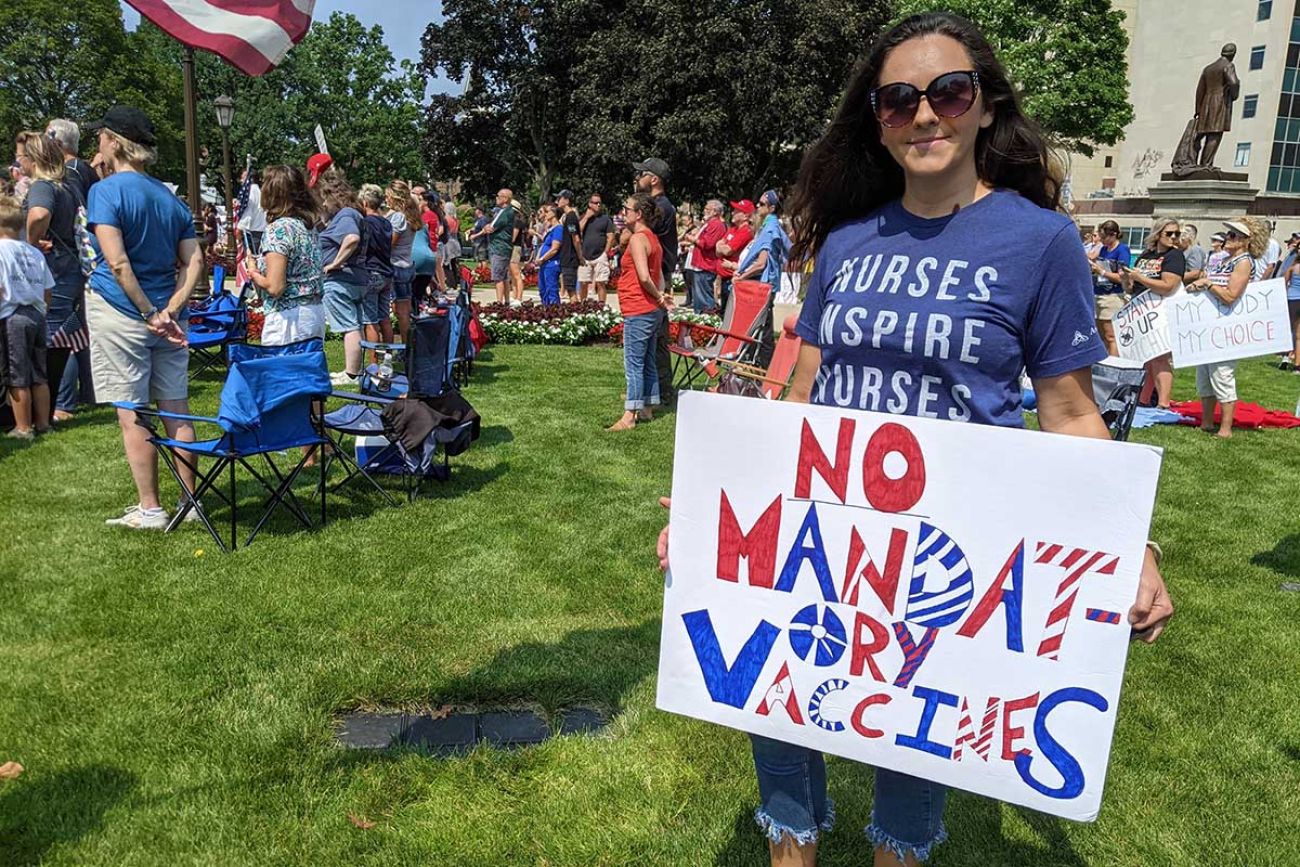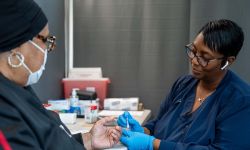400 workers out, 1,900 exempt after Henry Ford COVID vaccine mandate

Nov. 5: Facing COVID vaccine mandates, these Michigan residents just said no
Nov. 4: Biden mandate means 2 million Michigan workers must get COVID vaccine
Oct. 22: 370 Beaumont workers suspended for refusing COVID vaccines. 70 more quit.
Oct. 18: Michigan business leaders ask President Biden to reconsider vaccine mandate
About 400 staff have walked off the job at Henry Ford Health System rather than receive a required COVID vaccine, the Detroit-based hospital system said Tuesday.
Another 1,900 workers, however, received exemptions from the health system’s vaccine requirement.
The workers leaving comprised about 1 percent of the workforce of 33,000 people, said Bob Riney, chief operating officer for the five-hospital chain.
Related:
- COVID vaccine boosters: When, where and how to get them in Michigan
- After 18 months: Welcome back, Canada, if you’re vaccinated
- Michigan college COVID outbreaks plummet as students vaccinate and mask up
- Education levels drive Michigan vaccines. What’s rate in your neighborhood?
- COVID outbreaks in Michigan schools already 8 times higher than last year
- Science says school masks work. Public opinion is another issue in Michigan
- Michigan will disclose fewer school COVID outbreaks under new rules
“All things considered, we’re losing a very small segment of our workforce. I quite frankly wish that was zero, but it's not,” Riney said at an afternoon news conference. “But it's a very small percentage, and our new-hire process is already offsetting the folks who declined to be vaccinated and resigned.”
Roughly 6 percent of the remaining workforce of 33,000 employees were granted religious or medical exemptions, he said. About 1,900 requests for exemptions have been granted.
Nearly all the exemptions were granted for religious reasons with just a handful for medical reasons, according to Dr. Adnan Munkarah, Henry Ford’s executive vice president and chief clinical officer. About 250 requests for religious exemptions were denied, he said.
Stories from the front
Bridge Magazine, Detroit Free Press and Michigan Radio are teaming up to report on Michigan hospitals during the coronavirus pandemic. We will be sharing accounts of the challenges doctors, nurses and other hospital personnel face as they work to treat patients and save lives. If you work in a Michigan hospital, we would love to hear from you. You can contact reporters Robin Erb rerb@bridgemi.com at Bridge, Kristen Jordan Shamus kshamus@freepress.com at the Free Press and Kate Wells katwells@umich.edu at Michigan Radio.
Riney said there were a few other workers whose vaccine-related issues remained unresolved as of Tuesday.
“At this moment, we're still working through some cases and talking to some remaining noncompliant employees about their intentions,” he said.
Henry Ford, which this summer became the first Michigan health system to require employees to get a COVID-19 vaccine as a condition of continued employment, released the data following a deadline it had set for last Friday for workers to get at least a first vaccine dose.
It is among more than a half-dozen large Michigan health systems to impose a vaccine mandate. The numbers Tuesday underscore yet another COVID-19 dilemma for health care providers who, while wishing to boost vaccine requirements among staff, face the possibility of losing workers who refuse vaccines as COVID hospitalizations continue to increase and hospitals are dangerously short-staffed.
On Sept. 9, President Joe Biden announced a sweeping mandate that would require health care workers at nearly every hospital and health system in the country get vaccinated, or receive weekly COVID tests.
The Occupational Safety and Health Administration is now drafting detailed rules implementing the orders. But when they will be posted and enforced is still unknown.
In the meantime, a survey of a dozen Michigan hospital systems finds wide differences in worker vaccine rates, deadlines for vaccination, and in rules dictating who qualifies for an exemption.
At least three health systems — Trinity, Spectrum, and Munson — allow exemptions for employees with previous, documented coronavirus infections, with the rationale that previous infections provide some natural immunity from COVID-19. (The Centers for Disease Control and Prevention recommends people receive vaccinations even if previously infected.)
Munson Healthcare, Henry Ford and Spectrum also provide exemptions for pregnant employees.
Some, like Henry Ford, where staff had until midnight Friday to be vaccinated or get an exemption, say the vast majority of workers are now vaccinated — a level of protection they say benefits every patient who comes through their doors.
Staff vaccination rates are, perhaps unsurprisingly, far lower in hospitals that haven’t yet required staff to get vaccinated.
As many as 3 in 10 workers — clinicians peering into mouths and noses and staff making meals or cleaning rooms — in some health systems remain unvaccinated against COVID.
Notably, in the Detroit region first ravaged by the pandemic, Detroit Medical Center and McLaren Health Care declined to impose a vaccine mandate before the federal announcement. As of Friday, 70 percent of DMC’s and McLaren’s staff were vaccinated — among the lowest of hospitals surveyed by Bridge Michigan, the Detroit Free Press and Michigan Radio for this report.
“(W)e are working diligently every day to increase that rate and strongly encourage all of our employees to get vaccinated for COVID-19,” DMC spokesperson Jason Barczy said. “We don’t have any comment on the proposed (Biden) vaccine mandate.”
James Curtis, a spokesperson for McLaren, based in Grand Blanc in Genesee County, said it “intends to support and follow the recently announced federal vaccine policy guidelines and looks forward to receiving more information concerning these guidelines — including … mandatory weekly testing required for those exempted for religious and medical reasons.”
Lansing-based Sparrow Health System has a 72-percent vaccination rate, although it recently announced it will require weekly COVID testing for all of its 7,600 “caregivers” who are not fully vaccinated by Oct.18.
It’s a decision that “provides a path forward for patient and caregiver safety … while also showing compassion for those who do not wish, or are unable, to get the vaccine,” spokesperson John Foren said.
The UP Health System — with hospitals in Marquette, Ishpeming and Hancock — also has no coronavirus vaccine requirement in place for workers.
Janell Larson, spokesperson, did not say how many employees have been vaccinated, but wrote in an email that “UP Health System is aware of President Biden’s announcement about new federal COVID-19 vaccine requirements. Right now, we are working to understand the details of this development and the impact it will have for employees and providers at our facility.”
Many hospital systems that set early mandates achieved far higher vaccination rates, although it’s unclear in some cases whether the rates they released on vaccinated workers also include workers granted vaccine exemptions.
Livonia-based Trinity Health, which announced its mandate on July 8, reports that 94 percent of its staff “have documented their vaccination,” though its spokesman Bobby Maldonado declined to define whether that meant those workers are fully vaccinated or if it also included those with vaccine exemptions.
Others that announced mandates in July also said they had rates of 80 percent or higher, although they too would not say how many exemptions have been granted: Beaumont Health in Southfield (86 percent), Spectrum Health in Grand Rapids (96 percent), and Michigan Medicine in Ann Arbor (90 percent).
Several hospital representatives said some exemptions and documentation are still being reviewed, and numbers aren’t yet final.
Kalamazoo-based Bronson Healthcare, which announced its policy less than a month ago, said 77 percent of its 8,400 workers have been fully vaccinated, and hundreds more employees have received a first dose. And Traverse City-based Munson announced a mandate Sept. 22; it’s vaccination rate stands at 72 percent.
‘The hill I’m willing to die on’
But those high rates were achieved by hospitals trampling on individual rights to body autonomy, said Cristina Buia, a registered nurse for St. John Providence in Southfield and Novi, part of St. Louis, MI-based Ascension, which did not respond to a request for vaccine data.

For Buia, 33, refusing a vaccine is within her God-given freedom to maintain control of her body, which she noted the New Testament refers to as a temple for the Holy Spirit. For that reason, Buia said, she doesn’t drink alcohol, have pierced ears or “lead a promiscuous life.”
She said she’s successfully obtained a religious exemption from the hospital system for six years against the flu vaccine, and has worked with other nurses during the pandemic to get exemptions against the COVID vaccine.
Being forced to accept a vaccine runs counter to her oath as a nurse, which means allowing patients to choose what treatments they take or don’t take.
“If I were at a patient's bedside and I tried to force a medicine in them, I’d lose my job. And nurses wouldn't do that anyway. We love our patients,” she said.
And she’s willing to leave a job she loves to take a stand not only for herself, but for others, she said.
“I’ve been following religious exemptions for years now, and I knew this day would come,” she said, referring to government requirements of vaccines. “This is the hill I’m willing to die on.”
Most health systems reported that their numbers are preliminary and small, and the systems are still considering exemption requests.
Biden’s September announcement provided some cover for short-staffed health care companies that mandated the vaccine, but worried the policy would chase vaccine-hesitant workers to competing companies that did not have mandates.
At Trinity Health, a Livonia-based Catholic hospital system that employs 24,000 workers in Michigan and includes St. Joseph Mercy Health and Mercy Health, just 80 workers resigned rather than be vaccinated, according to a spokesperson.
And at Michigan Medicine in Ann Arbor, where some 33,000 employees must be fully vaccinated, or have an approved exemption by Nov. 1: “We have had fewer than 15 resignations spurred by the policy,” said Mary Masson, spokesperson.
It’s unclear what effect the federal order will have in hospitals without internal vaccine requirements. The U.S. Occupational Safety and Health Administration hasn’t yet issued details on that order.
When is a vaccine mandate an ‘undue hardship?’
Employees hoping to avoid a vaccination face an uphill battle in staying employed in health care, but experts on both sides of the debate say there are things that work in an employee’s favor.
Guidance by the U.S. Equal Employment Opportunity Commission instructs employers that they must assume an employee’s stated religious belief is sincerely held — whatever the employer's theological or scientific arguments.
“It’s irrelevant what they think … What is only relevant is what you believe and your belief and sincerely held belief,” said Mat Staver, founder and chairman of the Florida-based Liberty Counsel, a Christian advocacy organization that works with employees to obtain religious exemptions.
Still, employees can avoid extending a religious exemption from vaccines if doing so would cause an “undue hardship” on the employer, said Michael Burns, executive vice president of the Troy-based American Society of Employers, which consults with businesses on human resources issues.
Especially in health care, employers are “on very strong footing” in requiring vaccines since unvaccinated staff may pass infections onto patients and others, he said.
Hospitals and other employees must try to work with staff requesting a religious exemption and — if possible, find reasonable accommodations before issuing an ultimate order to dismiss or fire them. Those could include, for example, routine testing from unvaccinated workers, Burns said.
It’s about “risk management,” he said.
“Risk management in my mind is not rolling the dice” to see if you’ll get sued by a fired employee, he said. “It’s making sure all the proper processes are in place to make that final decision.”
What qualifies as a religious exemption is murky.
Employers generally have to take an employee at their word that they have a “sincerely held religious belief, practice, or observance.”
But there’s “no bright line standard” for what those are, said Brian Calley, president of the Small Business Association of Michigan.
The few small businesses applying a vaccine mandate “are simply not advertising the exemptions. If an employee claims an exemption or asks for one, the employer asks them to sign a form indicating that they qualify for the exemption,” he said.
Riney, the Henry Ford COO, declined to detail what qualified workers for religious exemptions, saying only that its team examined a person’s religious affiliation and “the history of that religious affiliation relative to vaccines” to decide.
The outcome, he said, “was very fair and objective about whether this was consistent with past behavior, consistent with their organization’s beliefs, or whether this was, you know, something that had been just put together in the hopes of getting an exemption.”
The American Civil Liberties Union, known for its work protecting the rights of those in the minority, has backed vaccine mandates, reasoning in part, that they help “further” civil liberties.
“They protect the most vulnerable among us, including people with disabilities and fragile immune systems, children too young to be vaccinated, and communities of color hit hard by the disease,” according to its position on mandates first published in the New York Times Sept. 2.
Obtaining a medical exemption can be tricky as well.
Dr. Dennis Cunningham, medical director of infection prevention at Henry Ford, said in a late June news conference that medical exemptions would be limited to people who have had severe allergic reactions to the first dose of a COVID-19 vaccine or to ingredients in the vaccines.
"There's very few reasons to not get the vaccine," he said.
Munkarah at Henry Ford said Tuesday that medical exemptions were granted to people with a true allergy to components of the vaccine, as well as those with "severe immune diseases" and people with long COVID who had symptoms that might be related to the immune response to the virus.
When it comes to religious exemptions, very few religions are opposed to COVID-19 vaccines as a matter of doctrine.
Christian Scientists have traditionally rejected the use of vaccines; most of its members rely on prayer for healing and have sought religious exemptions from vaccine mandates. Still, the church issued a statement on its website, saying that members "are free to make their own choices on all life-decisions, in obedience to the law, including whether or not to vaccinate. These aren’t decisions imposed by their church."
Some members of the Dutch Reformed Church also oppose vaccines, believing they interfere with God's will. But that isn't an absolute, either. Some members also view the vaccines as gifts from God, according to a review of religious objections to vaccines from Vanderbilt University.
Catholics have had some limited objections, too.
In early March, Michigan's seven Catholic bishops, including Archbishop Allen Vigneron of the Archdiocese of Detroit, called the Johnson & Johnson vaccine "more morally problematic" than the Pfizer and Moderna vaccines because it used a fetal stem cell line in the testing of its vaccine. The bishops urged followers to only take the J&J vaccine "if there are no other alternatives.”
In August, Pope Francis appealed to the faithful to get vaccinated, calling vaccination “an act of love.” The Vatican previously extended permission for the faithful to get the J & J vaccine when “ethically irreproachable” vaccines are not available.
See what new members are saying about why they donated to Bridge Michigan:
- “In order for this information to be accurate and unbiased it must be underwritten by its readers, not by special interests.” - Larry S.
- “Not many other media sources report on the topics Bridge does.” - Susan B.
- “Your journalism is outstanding and rare these days.” - Mark S.
If you want to ensure the future of nonpartisan, nonprofit Michigan journalism, please become a member today. You, too, will be asked why you donated and maybe we'll feature your quote next time!





